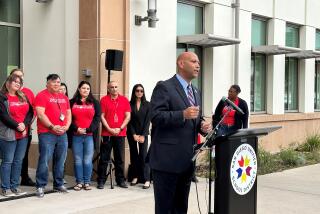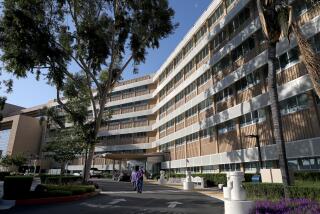Dyslexic Supervisor Complains of Bias : Hospital Ordered to Reinstate Worker
- Share via
A Superior Court judge found UC San Diego Medical Center and some staff members in contempt of court this week after they refused to comply with a court order to reinstate a hospital official suffering from a learning disability.
Judge James Milliken ordered UCSD Medical Center to immediately reinstate Sharon L. Meintz to her job as pediatric services director.
Meintz, 42, plans to return to work Monday.
Meintz sued the UC regents Feb. 5, claiming that they violated state and federal laws by discriminating against her because of her disability. The others named in the suit included hospital director Michael Stringer, hospital personnel manager Lon Orey, hospital labor relations director James Ohnesorge, and Sonya Healy, Meintz’s supervisor.
Robert B. Coffin, Meintz’s attorney, said she was born with dyslexia and her ability to communicate is severely impaired.
“She has a learning disability and sometimes inverts words and misspells names backwards. She has to sort them (words) and rearrange them to get in the proper order,” Coffin said.
Meintz was hired March 17, 1986, as the director of pediatric nursing, responsible for making sure that pediatric nursing services are provided. Coffin said the hospital knew of Meintz’s disability when she was hired.
UC regents attorney Milton Gordo, representing the hospital, disagreed.
“We knew she had some problems (when hired) but we were never told she would have special problems with interpersonal relations,” Gordo said.
The Federal Rehabilitation Act of 1973 prohibits discrimination in the employment of the disabled. Coffin said that the law requires employers who receive federal assistance to make reasonable accommodations for the disabled.
Coffin described his client as an extremely talented individual who has compiled an outstanding resume.
“She is a high-caliber person who has earned her master’s and Ph.D. She is a registered nurse who served in the Army during the Vietnam War and has published 30 to 40 articles. “She also runs a small nonprofit research organization,” Coffin said. “This is no slouch.”
According to Coffin, Meintz received letters of commendation from some doctors on the UCSD medical staff and was a good worker. Meintz’s job does not involve working directly with doctors.
“The best I can determine is that her boss took a dislike to her and went around and formulated a lot of discontent,” Coffin said. “Nobody there said she did a bad job. What you have is Ms. Healy saying that Sharon has bad management style.”
Coffin said Healy apparently didn’t believe Meintz was disabled, so she arranged to have Meintz’s condition reevaluated by Dr. Mary Louise Scholl of the UCSD medical staff. However, midway through the reevaluation, Healy told Meintz that the process was going be stopped.
Healy gave Meintz “30 days to shape up or be fired,” Coffin said. “How could she have possibly shaped up if this is her disability?
“I think when they learned that Dr. Scholl’s finding would conclude that Sharon was disabled, Ms. Healy had it stopped,” he said.
“The reevaluation was later completed by Dr. Scholl and found that Sharon was disabled, and the complaints expressed by hospital officials were directly related to the symptoms of her disability. The doctor further went on to say that Sharon is capable of doing the job,” Coffin said.
In a letter to the court supporting Meintz, Scholl said that it was her opinion that Healy’s complaints were a reaction to Meintz’s disability, Coffin said.
Healy didn’t return several calls to her office this week.
In her notice to terminate Meintz, Healy said Meintz was “not meeting the need of the nursing management,” Coffin said.
Presiding Superior Court Judge Michael Greer granted on Feb. 17 a temporary order restraining the hospital from terminating Meintz. Judge Vincent DiFiglia then issued a preliminary injunction blocking the dismissal of Meintz.
Locked Out of Office
When Meintz reported for work Feb. 22 she was locked out of her office and found that her administrative assistant had been reassigned, Coffin said. She was told by Ohnesorge to go home and that she would be charged vacation time for that period, he said.
Coffin said that after he contacted Ohnesorge about the court order, Ohnesorge asked Meintz to stay away voluntarily until he could arrange for her return in a week’s time.
When Meintz reported for work a week later, she found her office locked again. She then went to hospital director Michael Stringer, but he would not see her, Coffin said.
Coffin then returned to court and received the injunction from DiFiglia, with Healy and Ohnesorge attending the meeting.
Gordo, speaking on behalf of Ohnesorge, said: “We have always believed that we obeyed the original court order, which says she must not be terminated. It was in our best interests for the short time that she not report to work. This judge intervened and ruled differently from the first judge.”
Gordo said the hospital would comply with the judge’s ruling, but noted that the matter was still in litigation.
In his ruling Wednesday, Milliken said that by locking out Meintz the hospital effectively terminated her, Coffin said.
According to Coffin, Meintz moved to San Diego from Denver two years ago with her husband, Glenn, and their 17-year-old son because of the UCSD position. Glenn, 60, an engineer, has been unable to find employment in the area, leaving Meintz as the family’s sole provider.
Coffin said that when he first took the case he instructed Meintz to apply for other jobs, and she recently interviewed for a similar position at UCLA Medical Center in Los Angeles.
“If offered that position up at UCLA she will probably take it,” Coffin said. “It would solve the problem.”
He added: “We hope the university is going to comply. She is qualified to do the job. Obviously there is a lot of animosity. Given the pattern of UCSD administration, we probably will be back in court sometime soon.”
More to Read
Sign up for Essential California
The most important California stories and recommendations in your inbox every morning.
You may occasionally receive promotional content from the Los Angeles Times.










